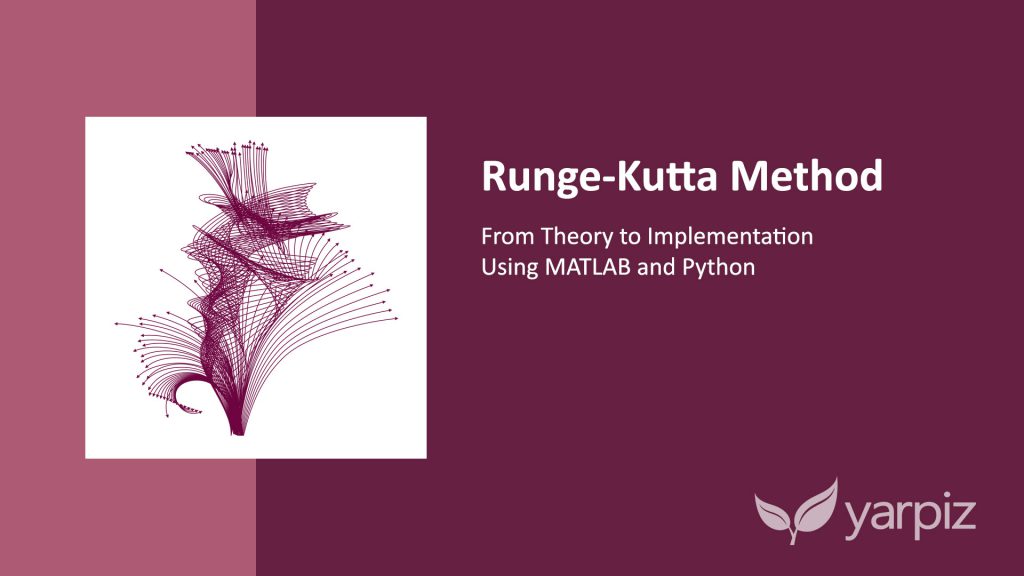The Runge-Kutta method is a numerical technique used to solve ordinary differential equations by iteratively approximating the solution. This essential technique is pivotal for solving ordinary differential equations, commonly employed in modeling dynamic systems. Python and MATLAB serve as ideal platforms for hands-on learning, offering robust libraries. Mastering Runge-Kutta is crucial for applications in physics, engineering, and biology. Join our free online course to unravel the power of computational mathematics and elevate your problem-solving skills.
What is Runge-Kutta method in simple terms?
Runge-Kutta method is a powerful mathematical tool for solving ordinary differential equations (ODEs). In simple terms, ODEs describe how a quantity changes with respect to another, like modeling population growth or decay over time. Runge-Kutta steps in when exact solutions are challenging.
Think of it like plotting the path of a wandering friend: at each step, you estimate their next location based on the direction they’re moving. Similarly, Runge-Kutta breaks down complex problems into manageable steps, providing a numerical way to track changes and predict outcomes over a sequence of intervals. It’s a go-to method in scientific and engineering simulations.

Why do we use the Runge-Kutta method and why is it important to learn it?
Runge-Kutta is crucial for solving complex problems where exact solutions are elusive, commonly seen in physics, engineering, and biology. It steps in when analytical solutions aren’t straightforward. If you aim to model real-world phenomena, like predicting population dynamics, Runge-Kutta equips you with the numerical tools needed for accurate simulations.
Engineers, scientists, and data analysts regularly encounter ODEs, making Runge-Kutta a valuable skill. Learning it opens doors to understanding dynamic systems, optimizing processes, and making informed decisions. Its applications span diverse fields, from predicting chemical reactions to simulating ecological interactions. Mastering Runge-Kutta empowers you to tackle intricate problems and contribute meaningfully to various disciplines.
About the Free Runge-Kutta Method in Python and MATLAB Online Course
In this video tutorial, the theory of Runge-Kutta Method (RK4) for numerical solution of ordinary differential equations (ODEs), is discussed and then implemented using MATLAB and Python from scratch. As an example, the well-know Lotka-Volterra model (aka. the Predator-Prey model) is numerically simulated and solved using Runge-Kutta 4th order (RK4), in both languages, Python and MATLAB.
Embark on a journey into numerical methods with our Free Runge-Kutta Method in Python and MATLAB Online Course. Beginning with the basics, we demystify the Runge-Kutta method, a key tool for solving ordinary differential equations (ODEs). Delve into MATLAB, where we craft and solve the Lotka-Volterra model using the powerful 4th order Runge-Kutta (RK4) algorithm.
In the MATLAB section, we guide you through implementing the Lotka-Volterra model as a function and creating an RK4 function. Witness the solution unfold as we apply RK4 to predict population dynamics. Transition seamlessly to Python, replicating the process, and gaining proficiency in this versatile numerical technique. To solidify your learning, we visualize results through insightful plots, providing a clear understanding of the impact of Runge-Kutta on problem-solving in both MATLAB and Python. Unlock the potential of numerical methods and elevate your skills with this comprehensive, hands-on course.

What you will gain after finishing Runge-Kutta Method in Python and MATLAB Online Course
Master the Runge-Kutta method and empower your problem-solving skills with our comprehensive online course in Python and MATLAB. By completing this course, you will grasp the fundamental concepts of the Runge-Kutta method, a powerful numerical technique for solving ordinary differential equations (ODEs). Navigate confidently through MATLAB and Python, implementing the 4th order Runge-Kutta algorithm to predict the dynamics of the Lotka-Volterra model, a classic biological system.
Upon finishing this course, you will gain proficiency in coding the Lotka-Volterra model and implementing the Runge-Kutta method from scratch in both MATLAB and Python. Visualize and interpret results through insightful plots, equipping yourself with a solid foundation in numerical methods. Be prepared to tackle real-world problems, applying the Runge-Kutta method to diverse scenarios. Elevate your programming skills, enhance your problem-solving capabilities, and emerge with the confidence to handle ODEs using Runge-Kutta in two of the most popular programming languages. Don’t miss the opportunity to transform your numerical methods expertise—enroll today and unlock a world of possibilities.
After completing this tutorial, you will learn:
- How to implement Runge-Kutta in Python
- How to implement Runge-Kutta in MATLAB
- Solving System of Nonlinear Differential Equations
- Simulation of a Lotka-Volterra (Predator-Prey) System
Course Outline and Content
Dive into the rich content of our Runge-Kutta Method in Python and MATLAB online course. The course unfolds with a solid introduction to the Runge-Kutta method, laying the groundwork for understanding numerical techniques to solve ordinary differential equations (ODEs). We delve into the key principles behind the 4th order Runge-Kutta algorithm, providing a comprehensive overview of its implementation in both MATLAB and Python.
Next, we guide you through a hands-on exploration of the Lotka-Volterra model, a classic biological system. You’ll witness the step-by-step process of coding the model, defining the Runge-Kutta method, and predicting system dynamics. The course extends to cover essential plotting techniques, allowing you to visualize and interpret results effectively. By the end, you’ll emerge well-versed in implementing numerical methods, equipped to address real-world challenges using the Runge-Kutta method in MATLAB and Python.
Enroll in this course to unlock a structured learning path, where each section builds on the last to provide a comprehensive understanding of the Runge-Kutta method and its applications in solving ODEs. Gain hands-on experience, enhance your coding skills, and acquire the confidence to apply numerical methods to tackle complex problems.
This course includes:
- More than one hour on-demand video
- Access on PC, mobile, tablet and TV on different platforms such as Yarpiz website, Youtube, Udemy and Alison
- Downloadable resources
- Certificate available on Alison
Who can benefit from this course?
This course caters to a diverse audience, making it invaluable for students, researchers, and professionals across various fields. If you’re a student studying numerical methods, computational mathematics, or scientific computing, this course provides practical insights into applying the Runge-Kutta method to solve differential equations—an essential skill for your academic journey.
Professionals in engineering, physics, biology, and related fields will find immense value in mastering the Runge-Kutta method. Whether you’re an engineer optimizing processes, a physicist modeling dynamic systems, or a biologist simulating ecological interactions, the skills acquired in this course empower you to leverage numerical methods for more accurate and efficient problem-solving.
Additionally, individuals working in data science and programming stand to gain a deeper understanding of numerical techniques. Whether you’re navigating data-driven challenges or developing algorithms, the ability to implement the Runge-Kutta method enhances your toolkit, enabling you to handle a broader range of computational problems in your professional domain.
Who this course is for:
- Applied Math and Science Students
- Engineering Students
- Anyone Interested in Numerical Computation
- Software Engineers and Programmers
Requirements
No prerequisites are required to dive into the Runge-Kutta Method in Python and MATLAB Online Course. The course is crafted to accommodate learners at various levels, from beginners in numerical methods to seasoned professionals seeking to enhance their computational skills. Whether you’re a student eager to explore numerical techniques or a professional looking to expand your problem-solving capabilities, this course provides a comprehensive learning experience accessible to all.
A basic understanding of programming concepts will be beneficial but not mandatory. If you’re familiar with the fundamentals of Python and MATLAB or have some coding experience, you’ll be better equipped to grasp the implementation aspects more quickly. However, the course includes step-by-step instructions and explanations, ensuring that even those with minimal programming exposure can follow along and build a solid foundation in applying the Runge-Kutta method to solve ordinary differential equations.
- Python and/or MATLAB Programming
- Differential Equations
Watch Online
The video tutorial is available to watch online, via Yarpiz YouTube Channel. The instructor of this course is Dr. Mostapha Kalami Heris, PhD of Control and Systems Engineering.
